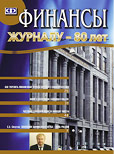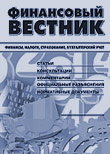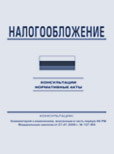Содержание
АКТУАЛЬНО
Р.Е. Артюхин, руководитель Казначейства России
E-mail: finance-journal@mail.ru
В 2023 г. исполняется 100 лет со дня образования контрольно-ревизионных органов Минфина России.
100-летие контрольно-ревизионных органов Минфина России – важная и знаменательная дата в истории управления финансами Российского государства. За этот значительный срок именно деятельность контрольно-ревизионных органов под руководством главного финансового органа страны (Наркомфин СССР, Минфин СССР, Минфин России) позволила закрепить самостоятельное отдельное направление в финансовой деятельности государства – государственный финансовый контроль, который прошел большой путь становления и развития. О том, какие этапы были в развитии государственного финансового контроля и как менялись функции контрольно-ревизионных органов Минфина России, ведется речь в данной статье.
Ключевые слова: государственный финансовый контроль, контрольно-ревизионные органы, Минфин России, юбилей.
E-mail: finance-journal@mail.ru
В этом году Коллегия Минфина России прошла в необычном формате. Она состоялась 14.04.2023 совместно с Коллегией Минэкономразвития России в Доме Правительства Российской Федерации и была посвящена итогам работы двух ведомств в прошедшем году и задачам, которые предстоит им решать в ближайшем будущем. В обзоре приводятся выступления участников расширенного заседания коллегий Минфина России и Минэкономразвития России.
Ключевые слова: Коллегия Минфина России, итоги работы, приоритетные направления деятельности, задачи на текущий год.
ФИНАНСЫ И БЮДЖЕТ: ПРОБЛЕМЫ И РЕШЕНИЯ
Л.Л. Игонина, заведующая кафедрой «Экономика и финансы» Краснодарского филиала Финансового университета при Правительстве Российской Федерации, доктор экономических наук, профессор
E-mail: lligonina@fa.ru
В 2010–2022 гг. экономика России и ее бюджетная сфера столкнулись с разными по происхождению кризисными ситуациями, оказавшими влияние на динамику субфедерального долга, долговую политику федерального центра и регионов. На основе анализа статистических данных в статье выявлены ключевые тенденции изменения объема и структуры государственного долга субъектов РФ, уровня долговой нагрузки на региональные бюджеты за данный период. Показаны особенности формирования параметров субфедерального долга в условиях кризисных потрясений и восстановительного роста. Предложены направления совершенствования инструментов долговой политики.
Ключевые слова: региональные бюджеты, государственный долг, долговая нагрузка, долговая политика.
К ГОДОВЩИНЕ ВЕЛИКОЙ ПОБЕДЫ
А.В. Пачкалов, доцент Финансового университета при Правительстве Российской Федерации, кандидат исторических наук
E-mail: zolornum@mail.ru
В статье рассматривается биография и деятельность А.Г. Зверева, занимавшего должность наркома (министра) финансов СССР в 1938-1960 гг. Отмечено, что А.Г. Зверев реорганизовал структуру Наркомата финансов, к 1939 г. добился выполнения плана по поступлениям в госбюджет налога с оборота. Особое внимание уделено работе А.Г. Зверева в годы Великой Отечественной войны. Показано, что под руководством А.Г. Зверева финансовая система страны была быстро перестроена для военных нужд. Отмечено, что он уделял внимание восстановлению народного хозяйства на освобожденных территориях, работе наркомата по обеспечению финансирования затрат на обучение молодых рабочих, заменивших ушедших на фронт отцов и старших братьев. А.Г. Зверевым была обеспечена мобили¬зация финансовых средств на военные нужды за счет выпуска облигаций государственных внутренних займов и повышения цен на товары не первой необходимости и др.
Ключевые слова: Арсений Григорьевич Зверев, наркомат финансов СССР, министерство финансов СССР, Великая Отечественная война, государственный бюджет, денежная реформа 1947 года.
НАЛОГИ: ТЕОРИЯ И ПРАКТИКА
В.Г. Пансков, профессор-исследователь Департамента налогов и налогового администрирования Финансового университета при Правительстве РФ, доктор экономических наук, профессор, заслуженный экономист Российской Федерации, государственный советник налоговой службы I ранга, лауреат общенациональной премии Российского профессорского собрания «Профессор года – 2022»
E-mail: 5868116@mail.ru
В статье дана критическая оценка попыткам решения вопросов формирования условий для эффективного и ответственного управления финансами путем введения в научный оборот новых понятий и терминов. Показано, что внесению подобных новаций должен предшествовать тщательный анализ внутреннего содержания нового понятия или термина, целей его введения, а также стоящих перед ним задач. На основе анализа отечественной научной литературы по налогам и налогообложению установлено, что эффективное и справедливое распределение налогов и налоговых платежей между уровнями бюджетной системы может быть обеспечено без закрепления в научном обороте понятия «налоговый федерализм», как и иных видов федерализма.
Ключевые слова: Бюджетный кодекс, налоговые доходы, Налоговый кодекс, налоговый федерализм, разграничение налоговых полномочий, теория налогов и налогообложения, фискальный федерализм.
Л.Р. Ковтун, доцент кафедры финансов и финансовых институтов Байкальского государственного университета, кандидат экономических наук
Т.В. Щукина, заведующий кафедрой финансов и финансовых институтов Байкальского государственного университета, доцент, кандидат экономических наук
E-mail: lira-tim@yandex.ru
В статье отмечено, что одним из направлений развития новых информационных технологий является создание института единого налогового счета, предусматривающего консолидацию всех обязанностей налогоплательщика по уплате обязательных платежей в едином сальдо расчетов с бюджетами, требующее организации тесного взаимодействия ФНС и Казначейства России. Показано, что институт единого налогового счета представляет собой новый этап цифровизации, Отчечено, что внедрение технологии перечисления единого налогового платежа обеспечит минимизацию ошибок при заполнении расчетного документа плательщика, приведет к значительному сокращению невыясненных поступлений, а также оптимизирует взаимодействие Федерального казначейства и ФНС России. Уделено внимание пробелам переходного периода, связанным с перестройкой процессов организации исполнения бюджетов бюджетной системы страны по доходам и расходам.
Ключевые слова: цифровизация, единый налоговый платеж, единый налоговый счет, платежное поручение, исполнение бюджета.
Л.С. Катулевская, директор Департамента налогов Сбербанка
В.П. Казенникова, руководитель направления Департамента налогов Сбербанка
С.В. Бордовский, главный экономист Департамента налогов Сбербанка
E-mail: Bordovskiy.S.V@sberbank.ru
Отмечая, что меры налоговой политики являются одним из ключевых инструментов системы стимулирования экономического роста и государственной поддержки бизнеса, авторы анализируют возможности налогоплательщиков воспользоваться отдельными мерами, приводят примеры, статистику. Показано, что на качество налоговых льгот, как мер стимулирования, оказывает влияние не только потенциальное снижение налогового бремени, но и прозрачность критериев применения, соответствие льгот деловой практике. Также важны низкие затраты на администрирование процессов применения и подтверждения законности такого применения налоговых льгот.
Ключевые слова: меры налоговой политики, государственная поддержка бизнеса, налоговые льготы, меры налогового стимулирования, прозрачность критериев применения льгот.
Т.Ю. Солодимова, старший преподаватель кафедры налогов и налогообложения Приволжского института повышения квалификации ФНС России (Н. Новгород)
Email: tusolod@mail.ru
В статье проанализирован механизм предоставления стандартных вычетов на детей, раскрыты сложные вопросы, связанные с правом на вычет с учетом позиций, представленных в письмах Минфина России, ФНС России, судебных решениях. Автором сделан вывод о необходимости урегулирования непрописанных в ст. 218 НК РФ законодательных норм в части предоставления налогоплательщикам стандартных вычетов на детей, сформулированы предложения.
Ключевые слова: налог на доходы физических лиц, налоговые вычеты, стандартные вычеты, налоговая база, право на получение стандартного вычета, предоставление вычета в двойном размере, единственный родитель.
ФИНАНСОВЫЙ КОНТРОЛЬ И АУДИТ
С.В. Головин, доцент кафедры экономического анализа и аудита Воронежского государственного университета, кандидат технических наук, доцент
E-mail: golovin@econ.vsu.ru
В статье проведен анализ становления нормативно-правовой базы применения риск-ориентированного подхода к контрольно-надзорной деятельности в Российской Федерации и обоснована необходимость его внедрения в практику осуществления ведомственного контроля финансово-хозяйственной деятельности государственных (муниципальных) учреждений. Предложены этапы процесса реализации риск-ориентированной модели ведомственного контроля финансово-хозяйственной деятельности и Типовые критерии отбора государственных (муниципальных) учреждений для проведения ведомственного контроля финансово-хозяйственной деятельности.
Ключевые слова: риск-ориентированный подход, ведомственный контроль финансово-хозяйственной деятельности, государственные (муниципальные) учреждения, оценка риска.
ФИНАНСЫ ЗАРУБЕЖНЫХ СТРАН
А.Ю. Демидов, заместитель руководителя Казначейства России, заслуженный экономист Российской Федерации, доктор экономических наук
E-mail: finance-journal@mail.ru
д. Ахмад Низар Аль-Вади, Сирийская Арабская Республика, доктор экономических наук
E-mail: finance-journal@mail.ru
Д.С. Лазарева, начальник отдела внедрения казначейских технологий Управления ведомственных проектов Казначейства России
E-mail: finance-journal@mail.ru
В данной статье рассматриваются отдельные вопросы текущего состояния казначейской системы исполнения бюджетов Сирийской Арабской Республики и возможные направления модернизации этого процесса с учетом опыта Казначейства России.
Ключевые слова: казначейская система, казначейские технологии, бюджетное законодательство, бюджетный процесс, Сирийская Арабская Республика, Казначейство России.
Content
TOPICAL
R.E. Artyukhin, head of the Treasury of Russia
E-mail: finance-journal@mail.ru
2023 marks the 100th anniversary of the formation of the audit bodies of the Ministry of Finance of Russia.
The 100th anniversary of the audit bodies of the Ministry of Finance of Russia is an important and significant date in the history of financial management of the Russian state. During this significant period, it was the activities of the audit bodies under the leadership of the country's main financial body (the People's Commissariat of Finance of the USSR, the Ministry of Finance of the USSR, the Ministry of Finance of Russia) that made it possible to consolidate an independent separate direction in the financial activities of the state - state financial control, which has passed a long way of formation and development. What stages were in the development of state financial control and how the functions of the control and audit bodies of the Ministry of Finance of Russia changed is discussed in this article.
Keywords: state financial control, control and audit bodies, Ministry of Finance of Russia, anniversary.
E-mail: finance-journal@mail.ru
This year, the Collegium of the Ministry of Finance of Russia was held in an unusual format. It took place 14.04.2023 together with the Board of the Ministry of Economic Development of Russia in the House of Government of the Russian Federation and was devoted to the results of the work of the two departments last year and the tasks that they have to solve in the near future. The review provides speeches by participants in an expanded meeting of the boards of the Ministry of Finance of Russia and the Ministry of Economic Development of Russia.
Keywords: Board of the Ministry of Finance of Russia, results of work, priority areas of activity, tasks for the current year.
FINANCE AND BUDGET: PROBLEMS AND SOLUTIONS
L.L. Igonina, head of the Department of economics and finance, Krasnodar branch of the Financial university under the Government of the Russian Federation, doctor of economics, professor
E-mail: lligonina@fa.ru
In 2010-2022 the Russian economy and its budget sector faced crisis situations of different origin, which influenced the dynamics of sub-federal debt, the debt policy of the federal center and the regions. Based on the analysis of statistical data, the article revealed key trends in the volume and structure of public debt of the constituent entities of the Russian Federation, the level of debt burden on regional budgets for this period. Features of subfederal debt parameters formation in conditions of crisis shocks and recovery growth are shown. Directions for improving debt policy instruments have been proposed.
Keywords: regional budgets, public debt, debt burden, debt policy.
ON THE ANNIVERSARY OF THE GREAT VICTORY
A.V. Pachkalov, associate professor of the Financial uUniversity under the Government of the Russian Federation, candidate of historical sciences
E-mail: zolornum@mail.ru
The article considers the biography and activities of A.G. Zverev, who held the post of People's Commissar (Minister) of Finance of the USSR in 1938-1960. It was noted that A.G. Zverev reorganized the structure of the People's Commissariat of Finance, by 1939 he had achieved the implementation of the plan for income to the state budget of turnover tax. Special attention is paid to the work of A.G. Zverev during the Great Patriotic War. It has been shown that under the leadership of A.G. Zverev, the country's financial system was quickly rebuilt for military needs. It was noted that he paid attention to the restoration of the national economy in the liberated territories, the work of the People's Commissariat to ensure funding for the costs of training young workers who replaced fathers and older brothers who had gone to the front. A.G. Zverev ensured the mobili¬zatsiya of funds for military needs by issuing bonds of state domestic loans and raising prices for non-essential goods, etc.
Keywords: Arseniy Grigorievich Zverev, People's Commissariat of Finance of the USSR, Ministry of Finance of the USSR, Great Patriotic War, state budget, monetary reform of 1947.
TAXES: THEORY AND PRACTICE
V.G. Panskov, professor-researcher of the Department of taxes and tax administration of the Financial university under the Government of the Russian Federation, doctor of economics, professor, honored economist of the Russian Federation, state adviser to the Tax Service of the 1st rank, laureate of the national prize of the Russian professor's meeting "Professor of the Year - 2022"
E-mail: 5868116@mail.ru
The article gives a critical assessment of attempts to solve the issues of forming conditions for effective and responsible financial management by introducing new concepts and terms into scientific circulation. It has been shown that the introduction of such innovations should be preceded by a thorough analysis of the internal content of a new concept or term, the goals of its introduction, as well as the tasks facing it. Based on an analysis of domestic scientific literature on taxes and taxation, it was established that an effective and fair distribution of taxes and tax payments between the levels of the budgetary system can be ensured without consolidating the concept of "tax federalism" in scientific circulation, as well as other types of federalism.
Keywords: budget code, tax revenues, tax code, tax federalism, delimitation of tax powers, theory of taxes and taxation, fiscal federalism.
L.R. Kovtun, associate professor, Department of finance and financial Institutions, Baikal state university,candidate of economic sciences
E-mail: mayburov.home@gmail.com
T.V. Shchukina, head of the Department of finance and financial institutions, Baikal state uUniversity, candidate of economic sciences, associate professor
E-mail: lira-tim@yandex.ru
The article notes that one of the directions for the development of new information technologies is the creation of an institute of a single tax account, which provides for the consolidation of all taxpayer duties to pay mandatory payments in a single balance of settlements with budgets, requiring the organization of close cooperation between the Federal Tax Service and the Treasury of Russia. It has been shown that the institution of a single tax account is a new stage of digitalization, It is noted that the introduction of a technology for transferring a single tax payment will ensure the minimization of errors when filling out a payer's settlement document, lead to a significant reduction in unclear receipts, and also optimizes the interaction of the Federal Treasury and the Federal Tax Service of Russia. Attention was paid to the gaps in the transition period associated with the restructuring of the processes of organizing the implementation of the budgets of the country's budget system for income and expenses.
Keywords: digitalization, single tax payment, single tax account, payment order, budget execution.
L.S. Katulevskaya, director of the Tax department of Sberbank
V.P. Kazennikova, head of the Department of taxes of Sberbank
S.V. Bordovsky, chief economist of the Tax Department of Sberbank
E-mail: Bordovskiy.S.V@sberbank.ru
Noting that tax policy measures are one of the key tools of the system of stimulating economic growth and state support for business, the authors analyze the possibilities of taxpayers to take advantage of individual measures, give examples, statistics. It has been shown that the quality of tax benefits, as incentive measures, is influenced not only by a potential reduction in the tax burden, but also by the transparency of the application criteria, compliance of benefits with business practice. Also important are the low costs of administering the processes of applying and confirming the legality of such an application of tax benefits.
Keywords: tax policy measures, state business support, tax incentives, tax incentive measures, transparency of the criteria for applying benefits.
T. Yu. Solodimova, senior lecturer, Department of taxes and taxation, Volga institute for advanced studies, Federal tax service of Russia (N. Novgorod)
E-mail: tusolod@mail.ru
The article analyzed the mechanism for providing standard deductions for children, disclosed complex issues related to the right to deduction, taking into account the positions presented in letters from the Ministry of Finance of Russia, the Federal Tax Service of Russia, and court decisions. The author concluded that it is necessary to settle the legislative norms not signed in Art. 218 of the Tax Code of the Russian Federation in terms of providing taxpayers with standard deductions for children, proposals are formulated.
Keywords: personal income tax, tax deductions, standard deductions, tax base, right to receive standard deduction, provision of deduction in double amount, single parent.
FINANCIAL CONTROL AND AUDIT
S.V. Golovin, associate professor, Department of economic analysis and audit, Voronezh state university, candidate of technical sciences, associate professor
E-mail: golovin@econ.vsu.ru
The article analyzes the development of the regulatory framework for the application of a risk-oriented approach to control and supervisory activities in the Russian Federation and justifies the need to introduce it into the practice of conducting departmental control over the financial and economic activities of state (municipal) institutions. Proposed are stages of the process of implementing a risk-oriented model of departmental control of financial and economic activities and standard criteria for selecting state (municipal) institutions for departmental control of financial and economic activities.
Keywords: risk-oriented approach, departmental control of financial and economic activities, state (municipal) institutions, risk assessment.
A.Yu. Demidov, deputy head of the Treasury of Russia, honored economist of the Russian Federation, doctor of economics
E-mail: finance-journal@mail.ru
D. Ahmad Nizar Al-Wadi, Syrian Arab Republic, doctor of economics
E-mail: finance-journal@mail.ru
D.S. Lazareva, head of the Department of implementation of treasury technologies of the Department of departmental projects of the Treasury of Russia
E-mail: finance-journal@mail.ru
This article discusses certain issues of the current state of the treasury system for the execution of the budgets of the Syrian Arab Republic and possible directions for modernizing this process, taking into account the experience of the Russian Treasury.
Keywords: treasury system, treasury technologies, budget legislation, budget process, Syrian Arab Republic, Treasury of Russia.











